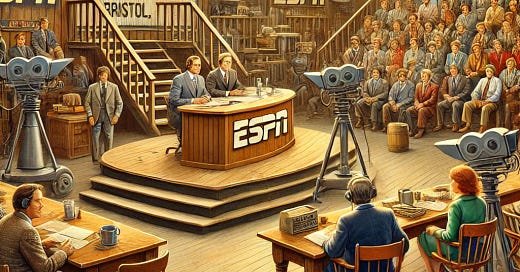Welcome back to "This Day in American History." I'm your host, Chuck Tanraty. Today, we're rewinding the clock to September 7, 1979, a day that marked a transformative moment in the world of sports broadcasting. On this day, ESPN, the Entertainment and Sports Programming Network, made its debut on cable television. It would go on to revolutionize not just sports coverage, but how millions of people around the world consume sports. Let's dive into the origins, growth, and impact of this pioneering network.
The story of ESPN began with a simple yet groundbreaking idea: a dedicated 24-hour sports network. It all started in May 1978 when Bill Rasmussen, a former World Hockey Association executive, was fired from his job with the New England Whalers. Rasmussen, along with his son Scott and friend Ed Eagan, envisioned a network that could deliver sports content around the clock, a radical concept at a time when sports coverage was limited to a few hours on weekends or sporadic broadcasts on major networks.
Initially, the team faced significant challenges. Their first office space in Plainville, Connecticut, was unsuitable due to a local ordinance that prohibited the installation of satellite dishes on rooftops. Undeterred, they found a new location in Bristol, Connecticut, where they could install the necessary equipment. Funding was another hurdle. The turning point came when Getty Oil agreed to purchase an 85% stake in the fledgling company in February 1979, providing the necessary financial backing and credibility to launch the network.
ESPN officially hit the airwaves on September 7, 1979, with the premiere of "SportsCenter," a sports news program that would become the network's flagship show. This was a bold move for a channel starting from scratch, but the unique 24-hour format quickly caught on with sports fans who were eager for more consistent and in-depth coverage.
The network's early days were marked by several strategic moves that helped build its credibility and expand its audience. In 1980, ESPN secured the rights to broadcast the early rounds of the NCAA Division I men's basketball tournament, a move that played a crucial role in transforming "March Madness" into a national phenomenon. That same year, ESPN began broadcasting the NFL Draft and Top Rank Boxing, bringing these events to a wider audience and laying the groundwork for its eventual dominance in sports broadcasting.
ESPN's fortunes took a significant turn in 1984 when the American Broadcasting Company (ABC) acquired the network. This acquisition provided ESPN with the financial muscle and industry clout to compete for major sports broadcasting rights. A landmark moment came in 1987 when ESPN secured a contract to broadcast NFL games on Sunday nights, introducing "Sunday Night Football." This move marked the first time the network truly competed with the major broadcast networks like NBC and CBS, shifting the dynamics of sports television.
The 1990s were a period of rapid growth and innovation for ESPN. The network expanded its offerings with the launch of ESPN2 in 1993, targeting younger audiences with a mix of mainstream and extreme sports. The launch of ESPN Radio in 1992 and subsequent digital ventures further solidified the network's position as a leader in sports media. ESPN became a one-stop destination for sports fans, covering a wide array of sports with live broadcasts, talk shows, documentaries, and more.
However, the 21st century has not been without challenges. The network has faced criticism for its perceived biases in coverage, conflicts of interest, and the impact of cord-cutting trends as viewers migrate to digital and streaming platforms. Despite these hurdles, ESPN has adapted by launching ESPN+, a streaming service, and forming partnerships to integrate sports betting content, maintaining its relevance in an evolving media landscape.
Today, ESPN is a cornerstone of sports broadcasting, available in over 70 million households in the United States and operating regional channels worldwide. Its influence extends beyond traditional broadcasting, with significant investments in digital media, radio, and international markets. The network has not only changed how sports are broadcast but has also influenced the sports themselves, creating events and moments that have become integral parts of sports culture.
As we look back on the debut of ESPN in 1979, it’s clear that this was more than just the launch of a cable channel. It was the start of a new era in sports media, one that continues to shape how we experience and engage with sports today.
Thank you for joining us on "This Day in American History." I'm Chuck Tanraty, and I hope you'll tune in next time as we continue to explore the events that have shaped our nation's story.













Share this post